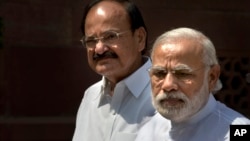India’s Information and broadcasting minister, M. Venkaiah Naidu has refuted allegations that raids carried out by the country’s main investigative agency on a top broadcaster were an infringement on press freedom.
His comments on Wednesday came in response to widespread concern that the action against the promoters of a TV news channel that has often been critical of the government’s policies could undermine press freedom in the world’s largest democracy.
Government action
The Central Bureau of Investigation (CBI) searched several premises of Prannoy and Radhika Roy, the promoters of NDTV news channel, earlier this week after receiving a private complaint that they caused a loss of loss of $7.5 million to a private bank from which they had taken a loan.
The promoters have denied claims of financial wrongdoing and said in a statement that the entire loan amount was paid in full seven years ago. It called the raids a “witch hunt” and an attack on press freedom.
Minister Naidu defended the action saying the law was taking its course. “The management and promoters have to stand scrutiny and answer to the people,” he said.
But that has done little to allay the concerns of critics who point out that the complaint which prompted the raids did not even come from the bank which CBI alleges made the losses.
Political move?
Bhaskar Roy, head of the Center of Media Studies in New Delhi, sees a “political angle” behind the CBI action against the NDTV promoters and says the reasons put out for the raids don’t add up. “The point I am making is, these are all silly reasons to somehow put them under pressure. It is muzzling independent press,” he told VOA.
The influential Editors Guild of India has expressed concern and condemned “any attempt to muzzle the media.” Many journalists have said that the raids raise disturbing questions.
“It’s very troubling and the answers have not come,” said independent political analyst Neerja Chowdhury in New Delhi. “For the moment what has come out does not sort of merit a CBI raid.”
Broadcaster is defiant
NDTV has said on its website that "We will not succumb to these attempts to blatantly undermine democracy and free speech in India."
The raids took place a day after an argument on television between the spokesman of the ruling Bharatiya Janata Party, Sambit Patra and a news anchor who asked him to apologize for his comment that the channel had an agenda.
This is not the first time that NDTV has had a brush with the government. Last year, the government imposed an unusual, one-day ban on NDTV Hindi channel saying it had disclosed sensitive information on a terror attack, but following an outcry it revoked the ban.
Message from government
Chowdhury sees the latest action against the channel's promoters as a message from Prime Minister Narendra Modi's Hindu nationalist government to the media: “The message would be, don’t be critical. I wont even say critical, questioning.”
The spotlight on media freedom in India came after this year's World Press Freedom Index compiled by Reporters Without Borders downgraded India’s ranking by three places citing concerns about Hindu nationalists trying to purge all manifestations of “anti-national” thought from the national debate. Placing India at 136 out of 180 countries, the report said this had resulted in “growing self censorship in the mainstream media.”




